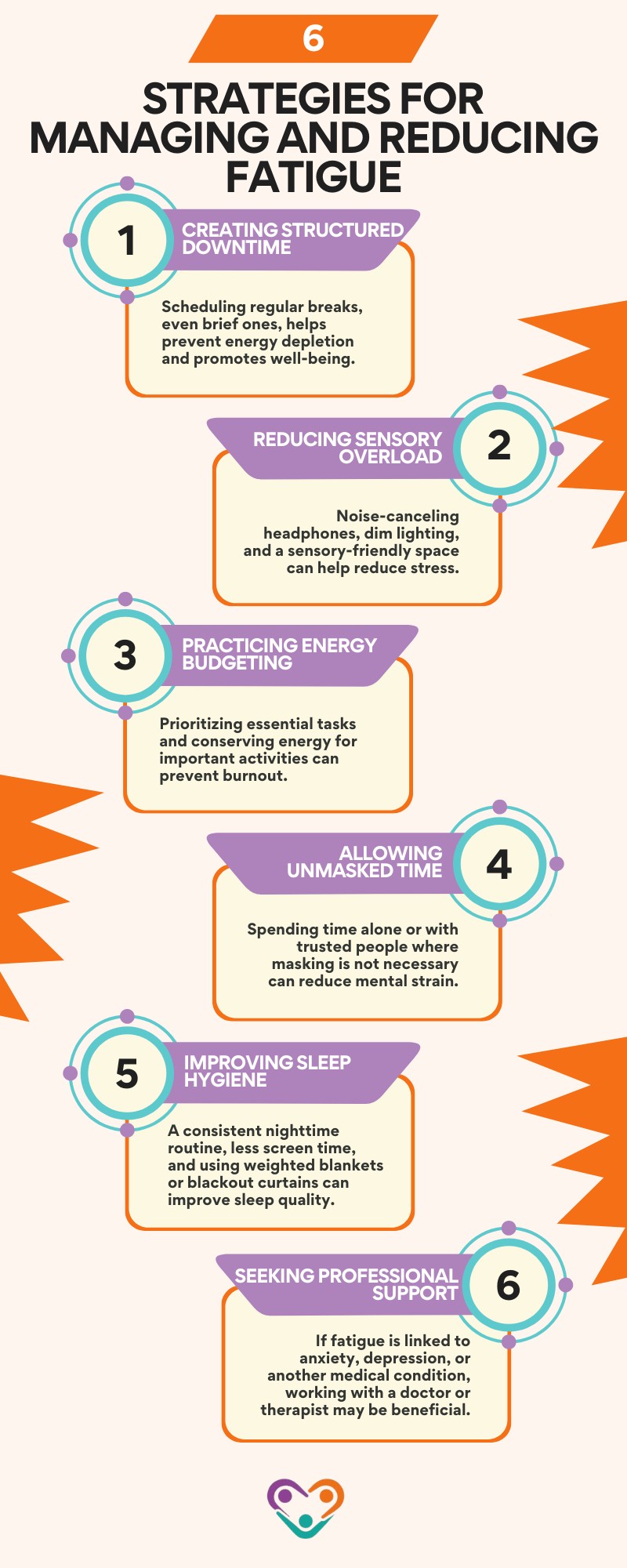Fatigue is a common but often overlooked challenge for adults on the autism spectrum. While exhaustion is something that everyone experiences, autistic adults frequently face persistent fatigue that goes beyond typical tiredness. This deep exhaustion, often linked to sensory overload, trauma, and the constant effort of masking, can affect daily life, work, relationships, and overall well-being.
It’s not just about needing more sleep — it’s a complex issue tied to sensory processing, mental overload, social demands, and co-occurring conditions.
How Fatigue Manifests in Autistic Adults
Fatigue in autistic adults does not always look the same as it does in neurotypical individuals. While general tiredness may cause sluggishness or a need for extra sleep, autistic fatigue often brings a combination of mental, emotional, and physical exhaustion.
Some common ways fatigue presents itself include:
- Cognitive Overload: Difficulty thinking clearly, processing information, or making decisions. This may feel like mental fog or a slowed-down brain.
- Increased Sensory Sensitivity: A heightened response to light, sound, touch, or other sensory inputs due to depleted energy levels.
- Emotional Dysregulation: Increased frustration, irritability, or a tendency to shut down emotionally. Small problems may feel overwhelming.
- Physical Exhaustion: A deep, whole-body tiredness that does not improve much with rest. Some autistic adults describe it as feeling “drained” or “running on empty.”
- Delayed Recovery Time: Even after resting, fatigue may linger longer than expected, making it hard to bounce back after social or sensory-heavy activities.
- Social Withdrawal: A need to avoid interaction, even with close friends or family, because socializing becomes too mentally demanding.
Autistic fatigue is more than just being tired after a long day. It often builds up over time and can lead to long-term burnout if not managed properly. Understanding what contributes to this exhaustion is key to finding relief.
What Causes Fatigue in Autistic Adults?
Fatigue in autistic adults is often the result of multiple factors working together. It is rarely caused by just one thing, which is why it can be difficult to pinpoint the exact reason for exhaustion.
Let’s look at each of them.
Masking and Social Exhaustion
One of the biggest sources of fatigue in autistic adults is masking, which is the act of suppressing natural autistic behaviors to appear more neurotypical. This can include forcing eye contact, mimicking expected social responses, or constantly monitoring tone and body language.
Masking requires an immense amount of mental energy. Many autistic adults report that socializing feels like being “on stage” or “performing” rather than just interacting naturally. Over time, this effort can lead to exhaustion, especially when there is no opportunity to decompress.
For some, even casual conversations can be tiring. Processing spoken words, understanding social cues, and responding appropriately all take energy.
After a long day of social interaction, an autistic person may need hours — or even days — to recover.
Sensory Overload and Environmental Stressors
Many autistic adults experience sensory sensitivities, meaning everyday environments can be overwhelming. Bright lights, loud noises, strong smells, or scratchy clothing can cause discomfort and drain energy.
Even if these things do not trigger a full meltdown, they contribute to a constant state of low-level stress.
Some environments, like grocery stores or office spaces, are especially exhausting. The combination of fluorescent lighting, background chatter, and unpredictable social interactions can quickly lead to sensory overload. For many autistic individuals, navigating the world means constantly filtering out overwhelming stimuli, which leads to fatigue over time.
Executive Function Struggles
Executive function involves skills like planning, organizing, and time management. Many autistic adults experience executive dysfunction, making it difficult to complete everyday tasks efficiently.
Something as simple as deciding what to eat for dinner or remembering to pay bills can take extra mental effort. The longer the day goes on, the harder these tasks become.
Some autistic adults describe this as feeling like their “brain battery” is running out, leaving them unable to complete even simple tasks by the end of the day.

Anxiety, Depression, and Co-Occurring Conditions
Mental health challenges like anxiety and depression are common in autistic adults and can contribute significantly to fatigue. Anxiety keeps the brain in a constant state of alertness, making it difficult to relax.
Depression can cause persistent low energy and motivation, making even basic self-care tasks feel overwhelming.
Other conditions, such as chronic pain, digestive issues, and sleep disorders, are also more common in autistic individuals and can add another layer of exhaustion. Undiagnosed or untreated health conditions may make fatigue worse, even when a person is getting enough sleep.
Sleep Difficulties
Many autistic adults struggle with sleep problems, including difficulty falling asleep, staying asleep, sleep apnea, or waking up feeling unrested. Some of the common reasons for sleep disturbances include:
- Sensitivity to light and sound
- Racing thoughts
- Irregular sleep patterns
Even after a full night of sleep, many autistic adults wake up feeling just as tired as when they went to bed. Poor sleep quality can worsen fatigue and make it harder to function throughout the day.
Tips for Managing and Reducing Fatigue
Fatigue may be a persistent challenge, but there are ways to manage energy levels more effectively. Every autistic person is different, so what works for one individual may not work for another.
However, some common strategies include:

Understanding personal limits and honoring energy needs can make a significant difference. Some days will be more exhausting than others, but taking steps to manage fatigue can help prevent long-term burnout.
Final Thoughts
Fatigue in autistic adults is a real and serious issue that goes beyond just feeling tired. It is often caused by a combination of social exhaustion, sensory overload, executive dysfunction, mental health struggles, and sleep difficulties. This type of exhaustion is not always visible to others, which can make it hard for autistic adults to get the support they need.
Recognizing the symptoms and causes of autistic fatigue is the first step toward better self-care and energy management. By making adjustments to daily routines, creating sensory-friendly environments, and allowing time for rest, it is possible to reduce fatigue and improve overall well-being.
Autistic adults deserve to have their energy needs respected, and finding sustainable ways to manage fatigue can lead to a healthier and more fulfilling life. At Golden Care Therapy, we provide high-quality ABA therapy in Georgia, New Jersey, Indiana, New York, and Florida, helping individuals build essential skills while honoring their unique needs.
Our compassionate team tailors each program to support meaningful progress and long-term success. Reach out to us today to learn how we can support you or your loved one on this journey!
Sources:



